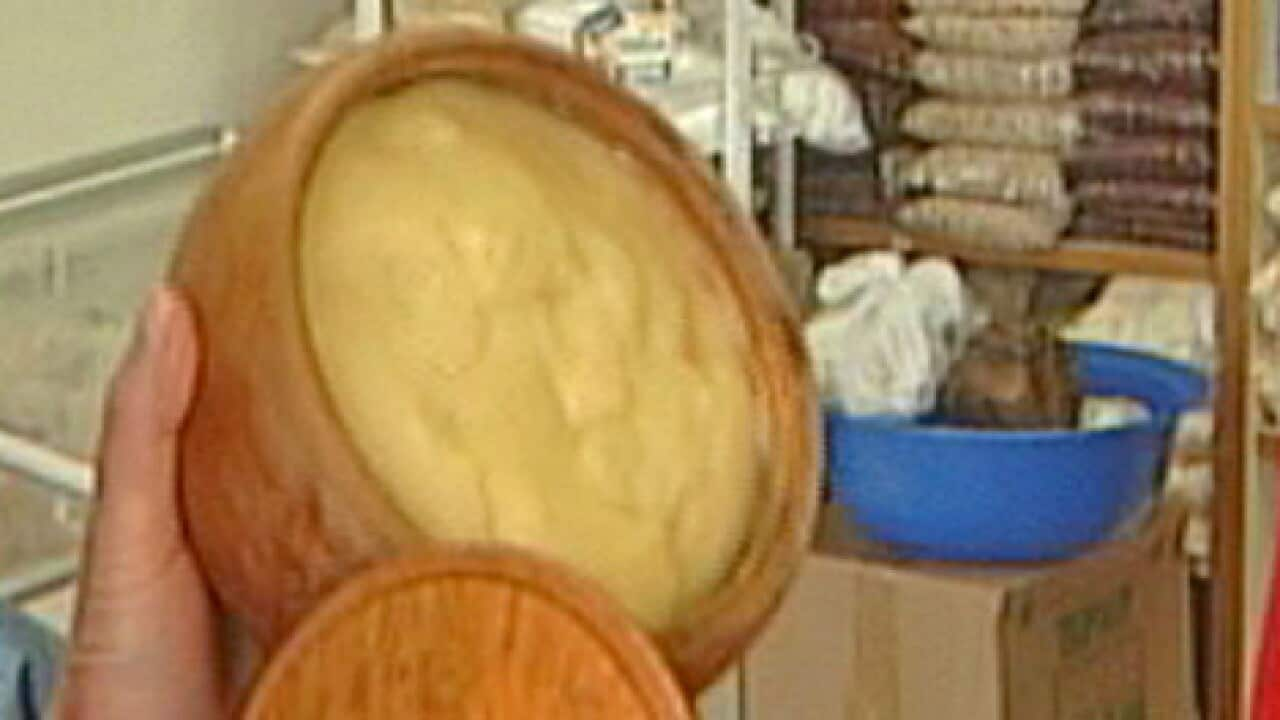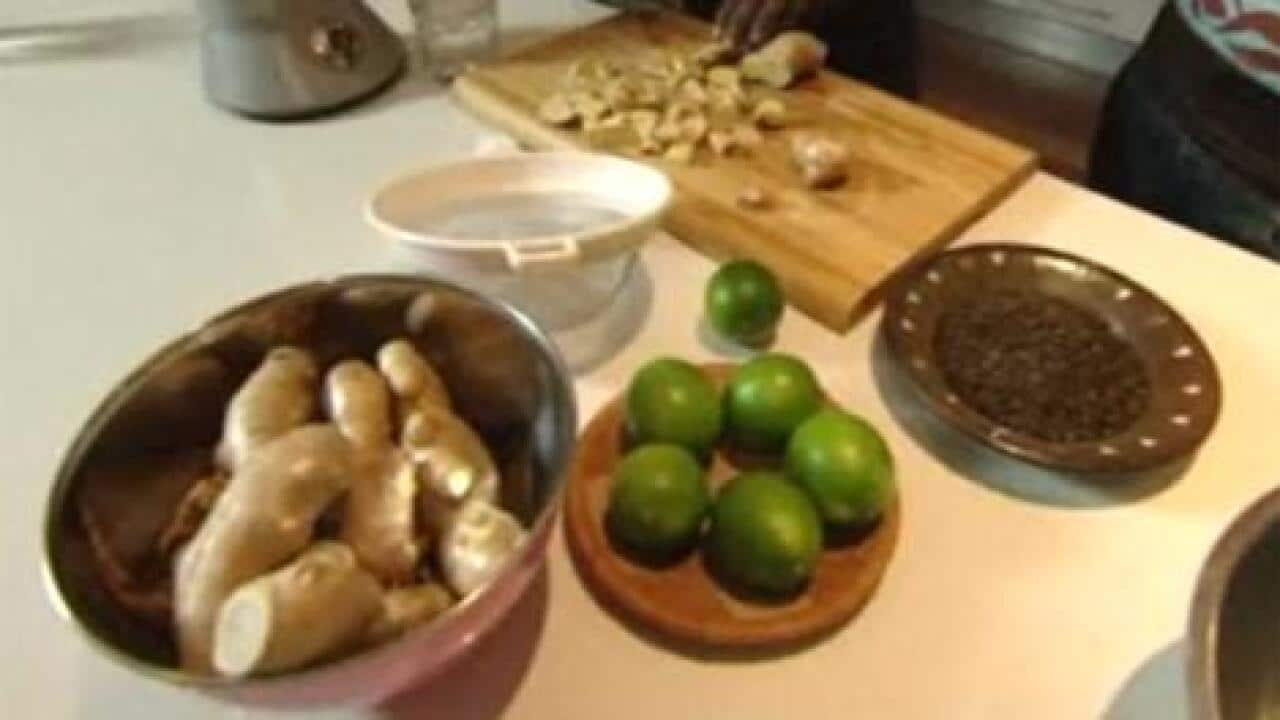Whether people like cooking or not, many get told from a young age to help out. Like many families in Ghana in the west of Africa, Gerondis grew up in a large family compound where her extended family, including her grandmother, aunties and cousins, shared the same outdoor kitchen in the centre of the compound. Mealtimes were very busy.
"[At] age six, I began helping my grandmother, Adaku, prepare dinner through simple tasks like passing her the spices, cooking utensils and washing vegetables," says Gerondis. "And when I was old enough, I was allowed to fan the coals on our coal pot fire."
Gerondis was taught from very early on how to grind spices, chillies, tomatoes and onions on a large grinding stone in the kitchen courtyard, how to make the national dish, jollof rice, and most importantly, how to pound plantain and cassava fufu with a large hand-carved pestle and mortar.
ABOUT FUFU

Fufu
"Pounding fufu was a task I didn't like as it was heavy manual work. One person folds or massages the fufu continually as the other does the heavy pounding," she says. "It's a very rhythmic action everyone needs to coordinate to, otherwise someone is going to get hurt."
The pounding process was even more demanding because her grandmother Adaku and auntie Cynthia did not want any lumps in the fufu.
"If any lumps were found I was sent straight back to the mortar and pestle to remove them, and I can assure you my fufu is very smooth and soft to this day."
Fufu, a soft, dough-like food, was mostly eaten on weekends and special occasions, and used in soups like nkrakra, a light and in nkate nkwan, peanut butter or groundnut soup. These were also the first two meals that Gerondis learned to make by age 12. These dishes featured at family birthdays, Easter and Christmas holidays.
Everyone in the family got involved in the preparation, making it a real family occasion.
In Ghanaian households, people typically make meals from scratch, which requires a trip to the local markets. During Gerondis' childhood, she accompanied her mother, auntie or grandmother every afternoon to make dinner by 6:30pm for her family.
By age 16, she also helped her auntie, Maude, who had a takeaway shop at the front of her home. Aunty Maude and made and banku, a kind of dumpling made from fermented corn and cassava dough.
"The only time we would eat outside our home was when as a teen I was invited to birthday parties, other than that, meals were always enjoyed at home and never in restaurants." Gerondis' had two favourite dishes while growing up. The first was okra stew with crab and garri – a granular flour from cassava root.
Gerondis' had two favourite dishes while growing up. The first was okra stew with crab and garri – a granular flour from cassava root.

Okra stew was one of Gifty Gerondis' favourite dishes growing up. Source: Gifty Gerondis
"We used to have most Saturdays for dinner and also during the week, and it was made by everyone in the family, including my grandmother, mother and aunties, who had their own special variations, and all claimed there's was the best," says Gerondis.
"Some added snails, some dried fish, even salted beef and lots of other variations, but the base recipe, of okra, shallots, ginger, garlic, tomato and palm nut oil was pretty much the same."
Her grandmother's version was her favourite so she paid close attention to how she made it. "Hers is the recipe I use mainly when I cook this dish today. The taste is salty, somewhat slimy and a little bit sweet and spicy." The second dish Gerondis remembers fondly is cooked for the Homowo harvest festival, celebrated in August by her family's tribe, the Ga people. Families celebrate with a feast, which includes fufu and palm nut soup.
The second dish Gerondis remembers fondly is cooked for the Homowo harvest festival, celebrated in August by her family's tribe, the Ga people. Families celebrate with a feast, which includes fufu and palm nut soup.

Gifty Gerondis' grandmother, Adaku. Source: Gifty Gerondis
"My favourite dish, made only once a year for the festival, is kpokpoi [also called kpekple], a very complex meal which has as its primary ingredients steamed and fermented cornmeal, palm nut soup and smoked fish, and any leftovers are cooked gently in a deep pan over the coals to make a very crunchy and delicious treat that kids especially loved," says Gerondis.
She explains that cooking it took several days. "Everyone in the family got involved in the preparation, making it a real family occasion that brought everyone together."
Starting a Ghanaian spice business in Australia
Gerondis came to Australia in 2008. She had a fascination with the country, including its lifestyle and opportunities, and she wanted to see it for herself. Upon visiting NSW, she met her now Greek-Australian husband, Adam Gerondis. They settled on the Central Coast and she started an online food business, Gifty's Ghana Kitchen.
"Throughout the years I began missing the food I grew up with, so eventually I decided to recreate one of my favourite spice blends that is traditionally used on suya, spicy meat skewers made over coals, and that's how Gifty's Ghana Kitchen began online in 2020."
"My 'Suya Gold Original Spice Blend' is based on [a] traditional suya [spice blend], for which each street vendor in Ghana has their own special recipe and mine is a combination of many of my favourites, where the taste is quite subtle without having any one spice overpower another." Gerondis hopes her business' nine handcrafted West African spice blends will help Australians to become more familiar with her culture and give African people a taste of home. The include chicken spice, jollof rice and .
Gerondis hopes her business' nine handcrafted West African spice blends will help Australians to become more familiar with her culture and give African people a taste of home. The include chicken spice, jollof rice and .

Gifty Gerondis cooking suya. Source: Gifty Gerondis
"What's different and makes my blends special is that I import our signature ingredient, grains of selim, known as etso in Ghana, a native African pepper and this is the one spice you cannot find anywhere else," says Gerondis.
Her blends are also free of salt, monosodium glutamate (MSG), sugar or any other additives.
"These grains have a unique aromatic musky flavour and are used as a peppery spice and as flavouring ingredients in many African soups, stews and spice drinks."
She suggests combining etso with her chai and Australian black tea. She recommends adding ginger, nutmeg, cinnamon bark and coriander seeds, and serving this with milk and honey. The concoction has a mild peppery and unique flavour.
I love sharing stories and memories from Ghana through food.
Gifty's Ghana Kitchen provides recipes and ideas on how to use her blends in simple, everyday meals and stories about Ghana. You can also find her Suya Gold Original Spice Blend through – a social enterprise that supports small scale food makers – in its .
"I love sharing stories and memories from Ghana through food and I have found that more and more people from all cultural backgrounds are now reaching out with a genuine interest in learning about the unique flavours of Ghana and trying them out."
All images belong to Gifty Gerondis.







